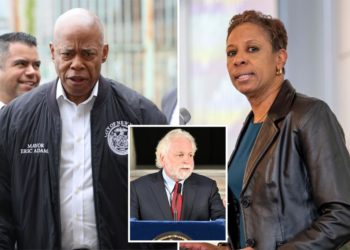When Donald Trump replaced US attorney for the Eastern District of Virginia Erik Siebert with Lindsey Halligan recently, he made no secret of her job responsibilities: Go after Adam Schiff, Letitia James, and James Comey. “We can’t delay any longer,” the president wrote in a social media post to his attorney general, Pam Bondi, noting that “Lindsey Halligan is a really good lawyer.”
Halligan is expected to fulfill her boss’s demands: Though prosecutors reportedly advised against charging Comey for lack of probable cause, she is expected to indict the former FBI director in the coming days.
That should satisfy Trump, who has long nursed a grudge against Comey over the Russia investigation that loomed over the opening of his first term. But it could also open up Halligan to legal trouble, an ethics professor at her law school tells Vanity Fair.
Halligan is a member of the Florida bar, explains Anthony V. Alfieri, director of the Center for Ethics and Public Service at Miami University School of Law, where Halligan earned her JD in 2013. That means she is bound by the Florida Rules of Professional Conduct. “She carries special responsibilities of a prosecutor in a criminal case,” Alfieri says. “Among those responsibilities is the core duty to refrain from prosecuting a charge that the prosecutor knows is not supported by probable cause.” Additionally, rules prohibit her “from engaging in conduct involving dishonesty, deceit, or misrepresentation,” says Alfieri, who did not know Halligan in school.
“In sum,” Alfieri says, “Halligan’s charging of Comey in Virginia puts Halligan herself at professional risk of disciplinary prosecution in Florida.”
Halligan comes to her post with no prosecutorial experience: She worked in insurance law until 2022, when she began working for Trump, including in his classified documents case. When Trump returned to office in 2025, she was appointed senior associate staff secretary in his White House, overseeing his effort to root out “improper ideology” from the Smithsonian. Now, she finds herself in the unusual position of having to find something to charge Comey with—before a statute of limitations runs out on Tuesday. “This isn’t normally a problem prosecutors face, as they start with a crime, then figure out whodunnit, rather than starting with a person and only then deciding whatthedun,” as Benjamin Wittes and Anna Bower wrote in Lawfare on Wednesday. “But Trump wants Comey charged and is convinced he’s guilty of something, and it’s your job now to figure out what.”
Comey, who was appointed by Barack Obama, led the FBI from 2013 to 2017. Two years into his tenure, the bureau opened its inquiry into Hillary Clinton’s use of a private email server as secretary of state. In July 2016, just before she formally accepted the Democratic nomination for president, Comey announced that while the investigation found she had been “extremely careless” in her handling of classified materials, there was no cause to bring charges. But that October—less than two weeks before Election Day—Comey publicly announced the probe had been reopened. The inquiry did not alter the FBI’s initial findings from the first investigation, but his public comments were widely seen as a major influence on the 2016 election.
“If the election was on October 27”—the day before Comey’s email investigation announcement—“I’d be your president,” Clinton said in 2017.
Despite the role he may have played in Trump’s election, he quickly became a villain in the MAGA universe for resisting the president’s efforts to pressure him, publicly contradicting Trump’s claims, and overseeing the investigation into Russia’s efforts to interfere in the 2016 campaign. And, after Trump fired him in May of 2017, Comey became something of a resistance figure.
“The idea that you’re going to go rummaging back through the sock drawer, back to 2020, to find something somebody said to put them in prison is totally nuts,” Van Jones said on CNN this week. “It’s the type of stuff that happens in a banana republic when you just go after your political enemies.”
Justice Department prosecutors had reportedly failed to find probable cause that Comey had committed a crime. But Trump—who has publicly pushed for action to be taken against Comey and others, such as Schiff, a Democratic senator, and James, the New York attorney general who successfully sued Trump for fraud—installed Halligan to “act fast” against his foes: “They were ruthless and vicious. I was impeached twice. I was indicted five times. It turned out to be a fake deal,” Trump told reporters last weekend. “And we have to act fast, one way or the other.”
According to reports, Halligan will seek to bring charges that Comey made false statements during Congressional testimony on the Russia probe in 2020. Whether they’ll stick—or backfire—remains to be seen.
More Great Stories From Vanity Fair
-
Charlie Kirk, Redeemed by the Media
-
How Erika Kirk Rose to Power
-
Dakota and Elle Fanning, Together at Last
-
Late-Night TV Isn’t Dying—It’s Being Strangled
-
The Florida Divorcée’s Guide to Murder
-
Decoding the Messages of Charlie Kirk’s Alleged Killer
-
Jessica Buttafuoco and the Price of Infamy
-
Exclusive: Emma Heming Willis and Bruce Willis at Home
-
From the Archive: The Hollywood Secret Katharine Hepburn Helped Bury
The post “At Professional Risk”: Charging Comey Could Land Lindsey Halligan in Hot Water appeared first on Vanity Fair.




